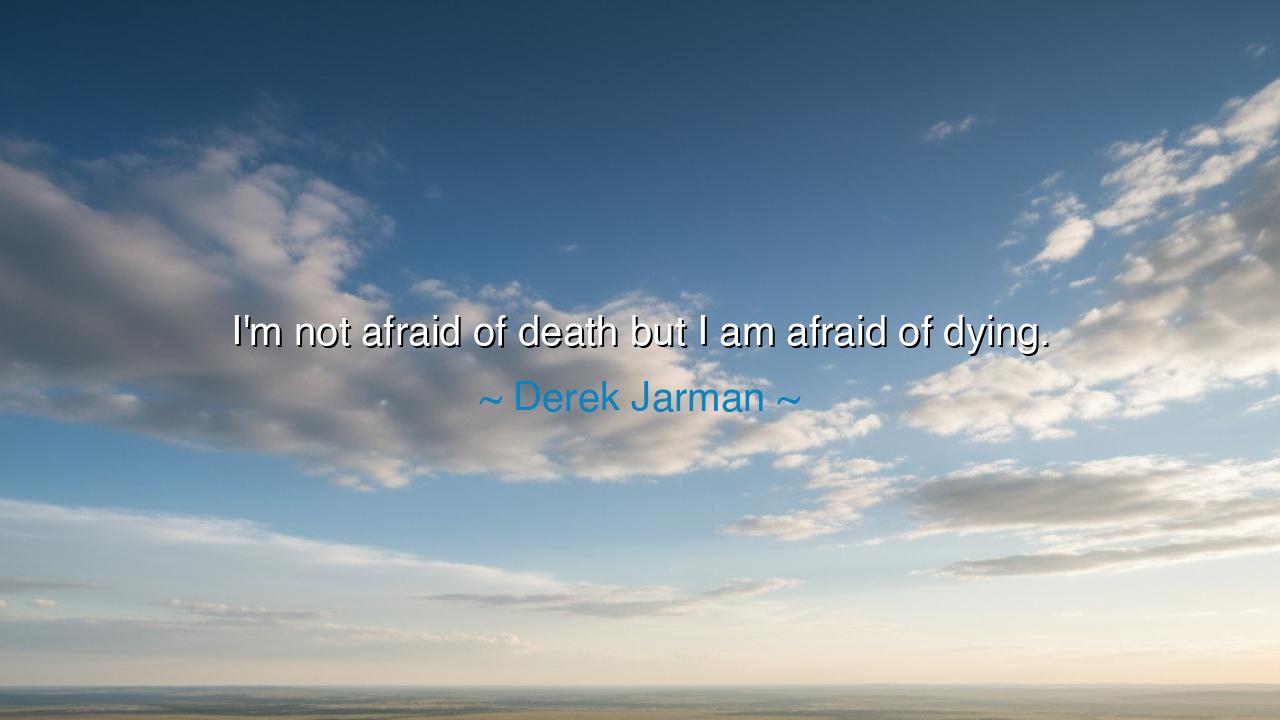
I'm not afraid of death but I am afraid of dying.






Derek Jarman once said: “I’m not afraid of death, but I am afraid of dying.” These words, stripped of pretense and trembling with truth, come from a man who faced the end not in abstraction, but in flesh and spirit. Jarman — filmmaker, artist, poet — spoke them while battling illness, his body frail but his soul unyielding. In this confession lies the wisdom of one who has looked into the eyes of mortality and seen both its terror and its peace. Death, he reminds us, is not the true enemy; it is the dying, the slow and conscious surrender, that fills the heart with dread.
To understand this, we must draw the line between death, which is final, and dying, which is the journey toward it. Death is silence — an end beyond pain, beyond fear, beyond striving. But dying is the passage through the shadow, where the body weakens and the spirit confronts its last fears. Jarman does not shrink from the idea of no longer being; rather, he fears the process of becoming nothing — the waiting, the suffering, the fading of light. It is not the stillness of the grave that unsettles him, but the struggle before it, the awareness of decay, the slow release of what one has loved so fiercely about life.
The ancients knew this paradox well. The Stoic philosopher Seneca, writing as an old man, said that death itself is nothing to fear — it is merely the end of sensation. “We suffer not in death, but in the thought of death,” he wrote. Yet even Seneca, who preached serenity before the inevitable, confessed the dread of dying badly — of pain, of indignity, of being torn from life piece by piece. To accept death as natural is one thing; to walk calmly through its slow approach is another. Jarman’s words capture this eternal tension: that man, though wise enough to understand death, is still bound to the frailty of his mortal flesh.
We see this truth reflected in the story of Socrates, who met his end with courage and clarity. He drank the cup of poison calmly, speaking to his disciples of the immortality of the soul. To him, death was but a doorway to wisdom beyond the mortal veil. Yet even Socrates’ followers trembled as they watched him die — not because they doubted his teaching, but because they could not bear to see the body’s slow submission to death. The philosopher himself may not have feared death, but his students feared dying — the breath that falters, the limbs that stiffen, the face that turns pale and still. In witnessing that moment, they saw what Jarman saw centuries later: that death is the mystery of being, but dying is the agony of leaving.
For Jarman, who faced a long illness, this fear was not philosophical but visceral. He felt his strength wane, his art slip from his hands, his world narrow into pain and silence. And yet, through that suffering, he created beauty — his films and writings became elegies to life, radiant with both defiance and grace. In his fear of dying, he revealed the deepest truth of the human spirit: that the dread of loss is itself a sign of how fiercely we love what we are about to lose. To fear dying is not weakness — it is love crying out against the fading of life.
But there is another kind of courage hidden in his words. When Jarman says he is not afraid of death, he is proclaiming victory over the ultimate fear — the fear of nonexistence. To make peace with death is to transcend the boundaries of self, to accept that the cycle of life continues beyond us. The wise do not rage against death itself; they prepare their souls to leave well, to depart with gratitude, not bitterness. What Jarman feared was not the afterlife or the void, but the passage — the human anguish that comes when body and soul must part. His words remind us that courage is not the absence of fear, but the strength to endure it with dignity and faith.
Let this be the lesson for those who walk the path of life: do not fear death, but live so deeply that dying finds you ready. Live each day with such fullness that when the final hour comes, you may face it not as a thief, but as a friend. Accept that the body must fall away, but feed the spirit with compassion, wisdom, and truth. Care for those who suffer, for you too will walk that road. And when you encounter fear — in sickness, in loss, in change — remember that it is the measure of your love for life, not a mark of your weakness.
For in the end, Derek Jarman’s words are not about fear, but about freedom. To fear dying is to honor life’s beauty; to not fear death is to accept its necessity. Between these two truths lies the art of living — the art of walking bravely toward the end while cherishing every step of the journey. If you live with that awareness, then death will not surprise you, and dying will not destroy you. You will have become, in the truest sense, a lover of life — and a friend to death.






AAdministratorAdministrator
Welcome, honored guests. Please leave a comment, we will respond soon